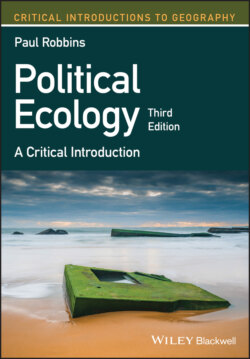Читать книгу Political Ecology - Paul Robbins - Страница 35
Critical environmental pragmatism
ОглавлениеAs fin de siècle natural sciences in Europe were colliding with theories of society and fostering the emergence of critical sciences at the human–environment interface, a simultaneous movement in North America sought to break the hold of determinism. While the momentum towards a critical human–environment project had been halted with the “false start” it made in its embrace of determinism (Turner 2002), a contrasting school of human impact study was emerging, closely informed by traditions of pragmatism and utilitarianism. Led most prominently by George Perkins Marsh, a Vermont‐born philologist with a lifetime of experience in the American diplomatic corps, a “new school of geographers” emerged in the late nineteenth century. For these researchers, the analytic challenge was to determine humanity's role in changing the face of the earth in order to preserve it for the future. Marsh wrote in a normative tone, insisting that responsible science and practical development required that conservation of the planet was essential, “thus fulfilling the command of religion and of practical wisdom, to use this world as not abusing it” (Marsh 1898, p. 7).
In his groundbreaking volume Man and Nature (later The Earth as Modified by Human Action) Marsh exhaustively listed the impact of human activity on degrading terrestrial ecosystems, rivers, lakes, and oceans, and traced the secondary impacts of such transformations on connected systems. In particular, Marsh was concerned with loss of forest cover, in terms of its effect on climate, erosion, and siltation of waterways. With remarkable foresight he anticipated the “invisible bonds” of ecology, pointing to the seriousness that declines in mayflies and aquatic larvae, for example, might have on the broader environment (Marsh 1898, pp. 136–137).
With its concerns for human impact on the landscape and its focus on the effects of uncontrolled extraction on the reproduction and sustainability of complex ecosystems, Marsh's work was a precursor to political ecology. Even so, the work contains very little in the way of political economy or any focus on the way economic and political power is exercised to determine the rate and character of these problems. Nor was his concern for the productive capacity of the ecosystem extended in any way to the local populations who had traditionally managed them. Indeed, in a revealing footnote, Marsh castigates the peasantry who “set fire to the woods and destroy them in order to get possession of the ground they cover” (p. 373 footnote), with absolutely no effort to place those actions in political or economic context. Why are peasants seeking to increase their holdings? What are the legal and institutional structures encouraging or dissuading such actions?
There is also in Marsh's work a remarkable enthusiasm concerning the power and desirability of human “reclamation” of the earth. Writing on American forest plantations, for example, he fervently asserts that forest can and should be established anywhere and everywhere possible, specifically for its timber value. He further insists on the great social benefits of draining swampland (which today we call “wetlands”) and straightening rivers, both practices that contemporary environmentalists abhor. His call for better stewardship of the environment was one that demanded more, not less, control over nature, especially by state authorities and private firms.
So while Marsh recognized the power of human economy to wreak environmental havoc, his faith in modernity's powers over nature led him to champion large‐scale authorities and economies in a way that might have made Wallace, Reclus, and Kropotkin (not to mention late‐twentieth‐century environmentalists) uncomfortable. Even so, these themes – degradation, sustainability, and the possibility of human beings to reclaim the earth – would all be central to political ecology a century later and its back‐and‐forth entanglements with modernity (see Chapter 13). Clearly, an incipient form of critique lay in the works of many researchers working at the nature–society interface in the twilight of the nineteenth century. Political ecology would not appear, therefore, as if with a thunderous lightning stroke, full‐grown, in the last decades of the twentieth century.
